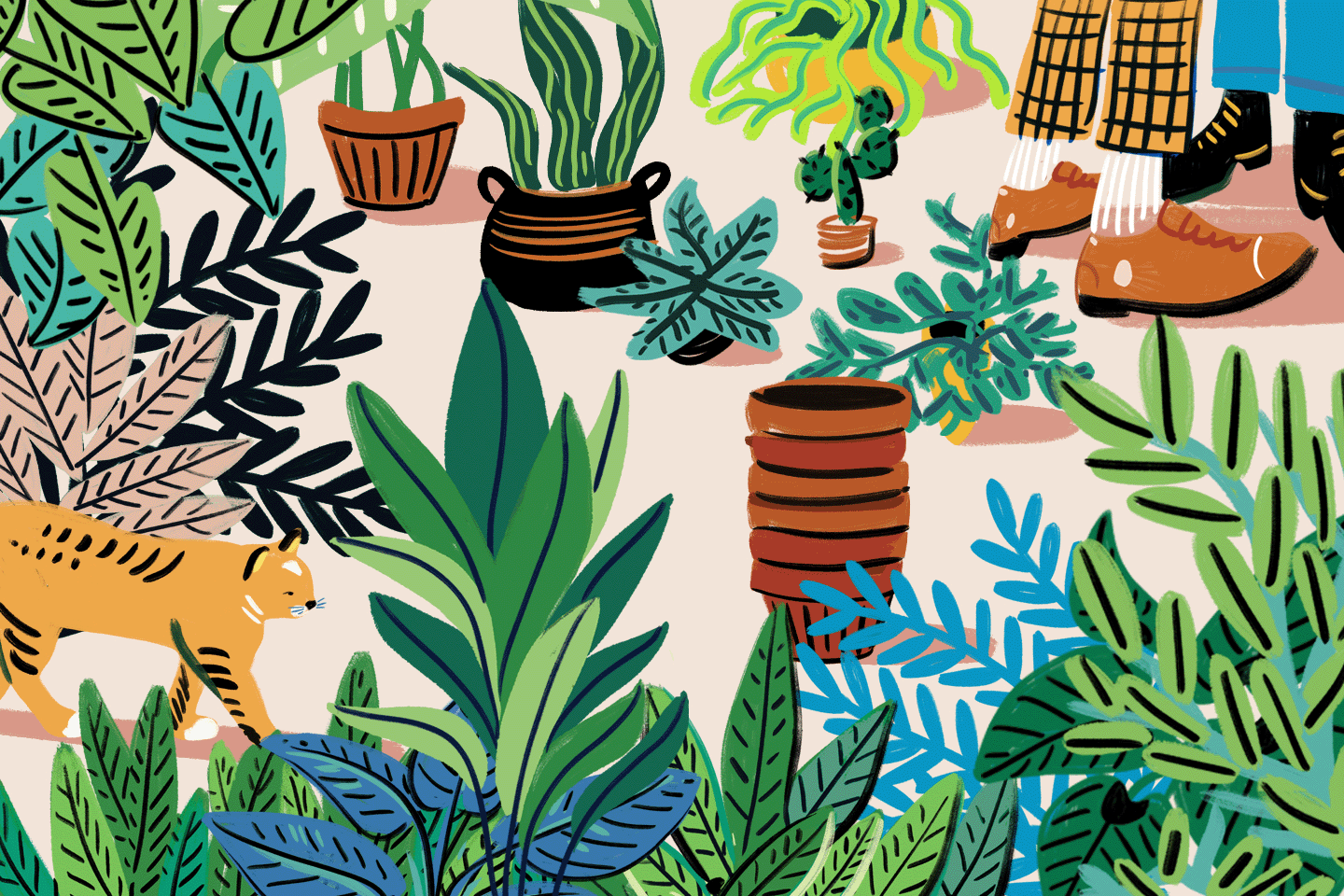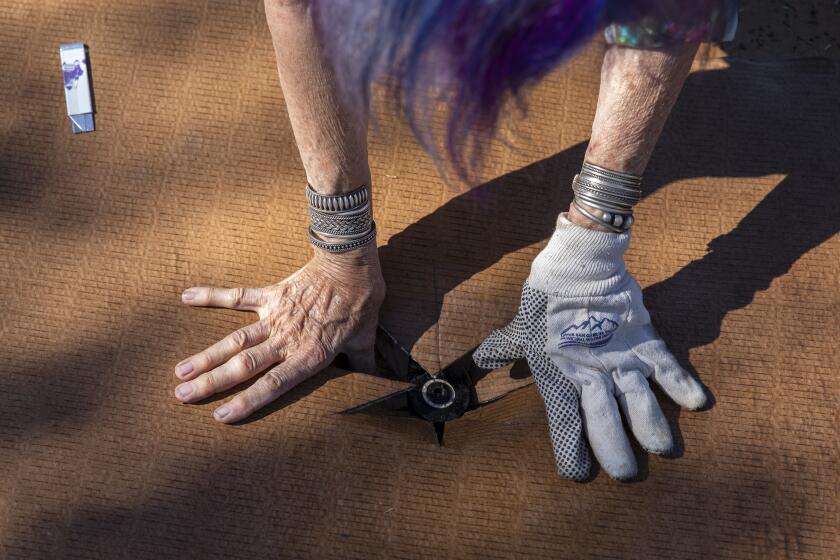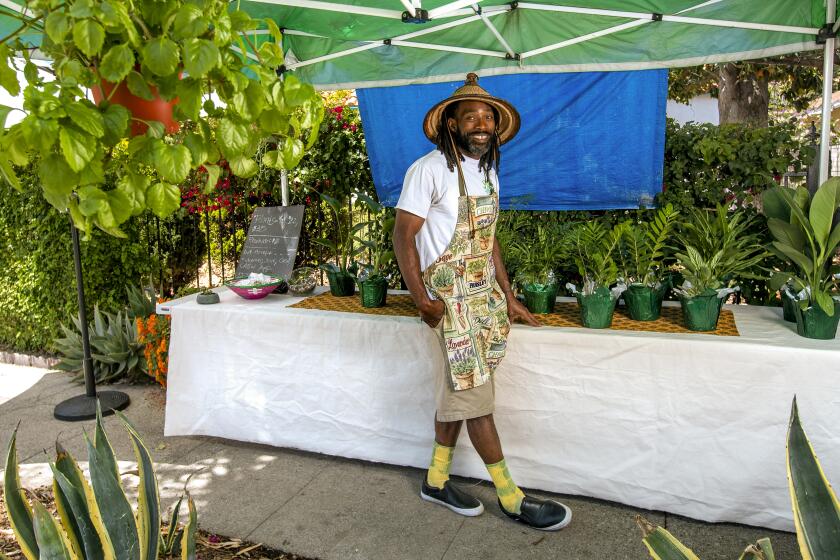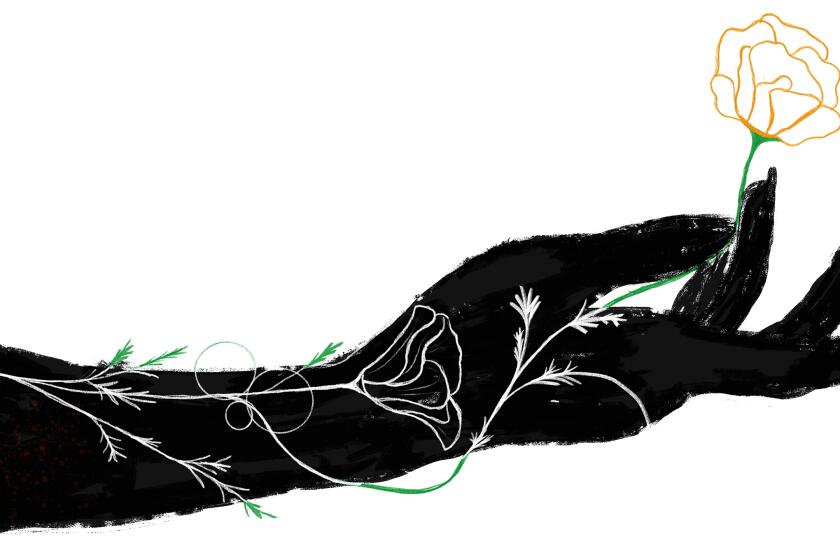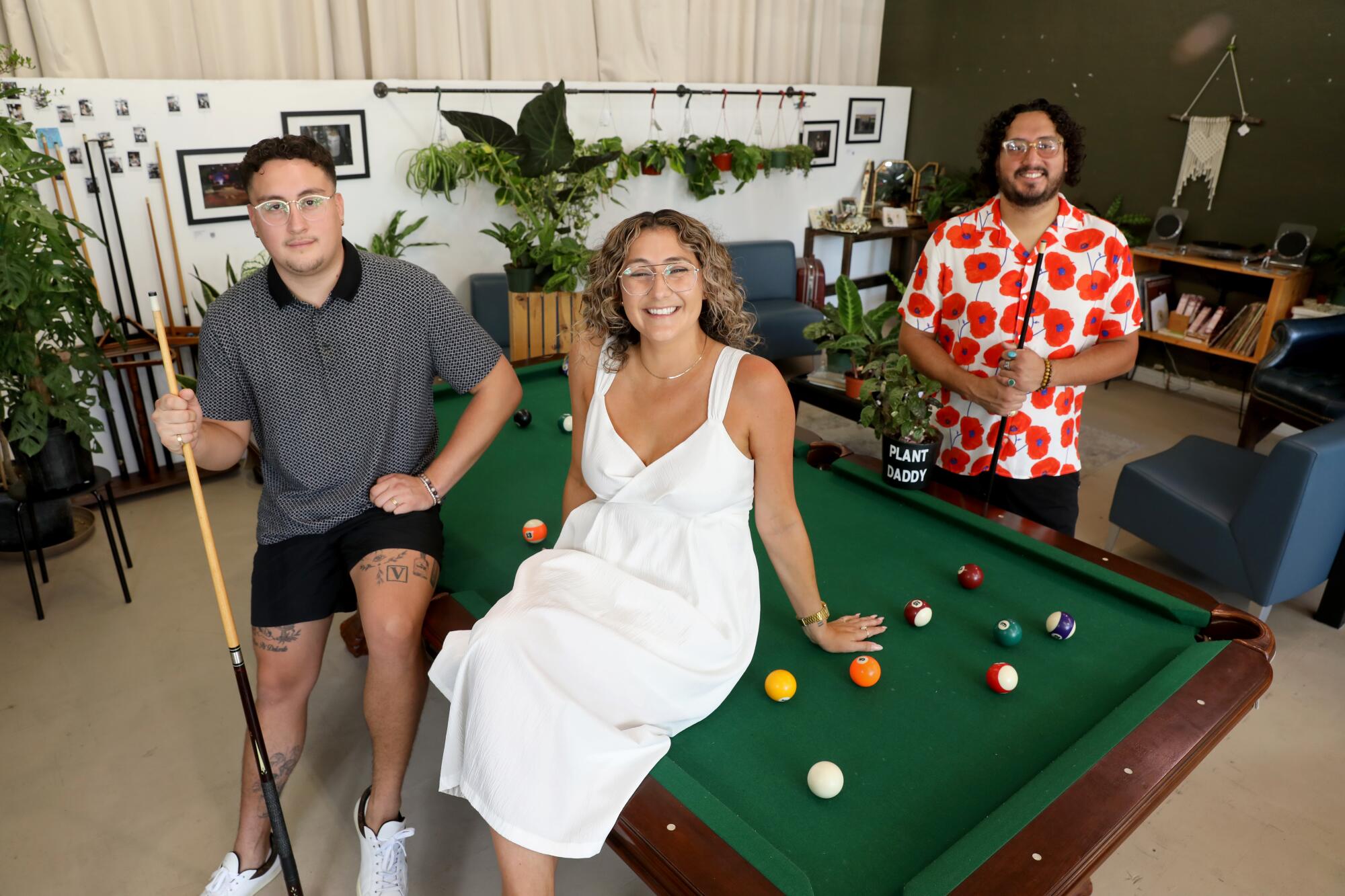
In our Plant PPL series, we interview people of color in the plant world. If you have suggestions for PPL to include, tag us on Instagram @latimesplants.
Cesar Duran is banned from starting any more businesses.
At least, that’s what his siblings joke. Cesar loves the rush of launching a company from scratch — the fresh idea, the crazy hours, the hard work that goes into creating something sustainable. And, of course, the fun that comes with bringing his siblings, Carla and Juan, along for the ride.
The latest Duran endeavor is an eccentric plant shop nestled in downtown Fullerton, where they whittled an old dance studio into the bright community hub. Semilla opened its doors in March 2021.
As the trio reclines on navy couches in the shop’s “calathea lounge,” their resemblance is undeniable — curly hair frames their smiling faces, glasses sit on their noses and their laughter rings like the bells on the front door.
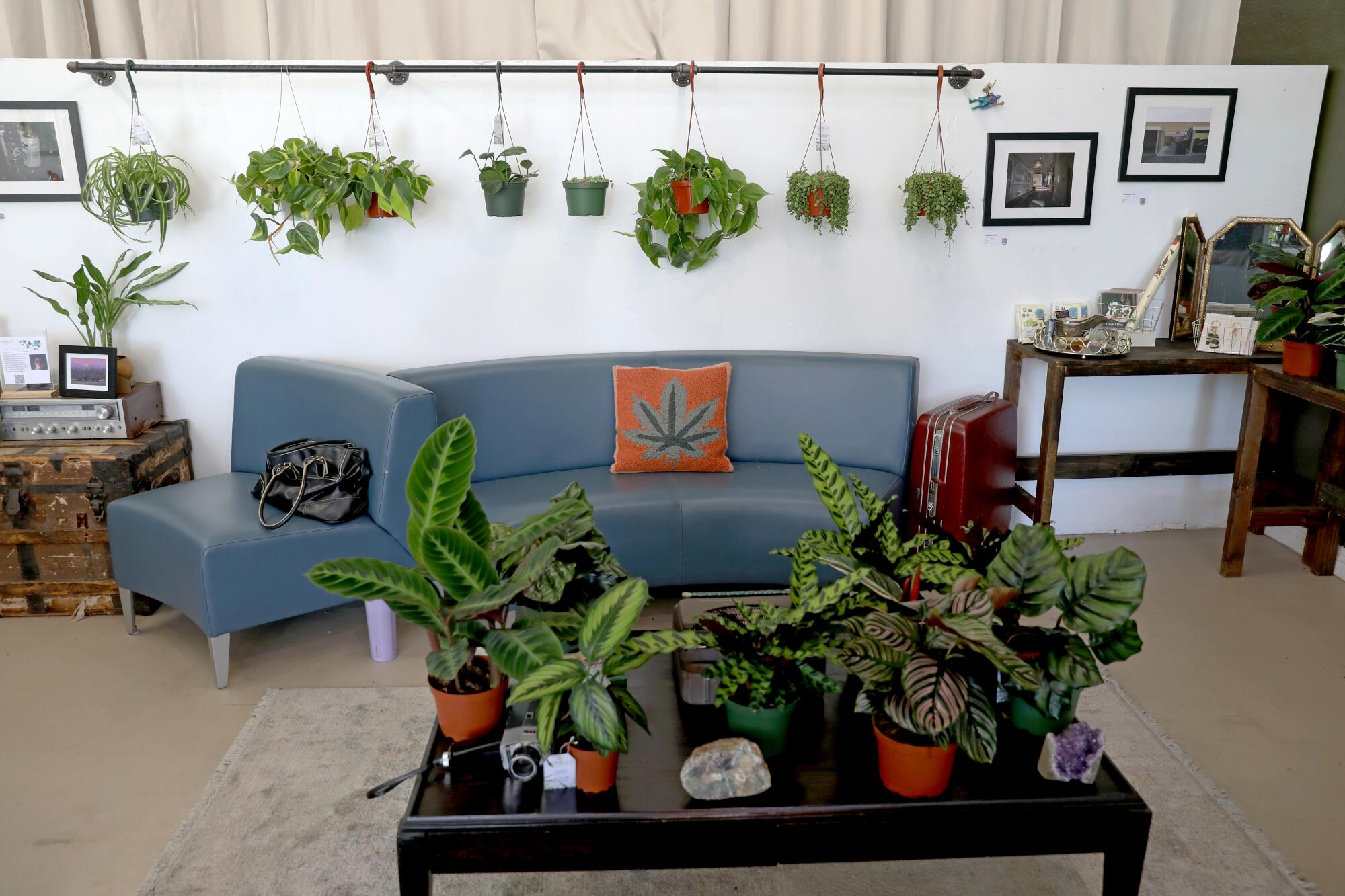
“In the beginning, I was like, ‘You’re crazy. Like, we cannot do this,’” Carla says, Pothos N’Joy leaves dangling above her. “But it’s like, the three of us together. We each bring something so different to the table. And we’ve gotten so much closer in this, and I love how much this has helped our family grow and develop.”
While Carla spearheaded the business side, Cesar and Juan muscled through construction, including hand-crafting wood tables and shelves. That’s how the three work, rounding each other out to form a powerful team. Cesar is the innovator, spilling out ideas and immune to limits. Juan is a problem-solver who thinks outside the box, handy when his siblings are stumped. Carla reins them both in, adding the voice of reason in her brothers’ antics.
“I’m very practical,” Carla says. “I try to keep things very —”
Cesar interjects, “She makes a list. She makes a list about making a list.”
Juan jumps in. “Carla, like, if you were to describe her it’s like she’s the only one in the household that looks like she has a real job.”
“Because I do,” says Carla, and they all laugh. (Her other job is working for the housing authority in L.A.)
From tiny storefronts to longtime family-run institutions, we curated this list of our favorite places to shop for houseplants in and around L.A.
Music hums through the store speakers surrounding a working record player, Al Green’s “Greatest Hits” peeking out from the cabinet below. Without seeing the face behind the register, it’s easy to tell which Duran is working by the music. Carla favors soul and old hip-hop, while Cesar loves funk and mambo. Juan will do anything for Bad Bunny.
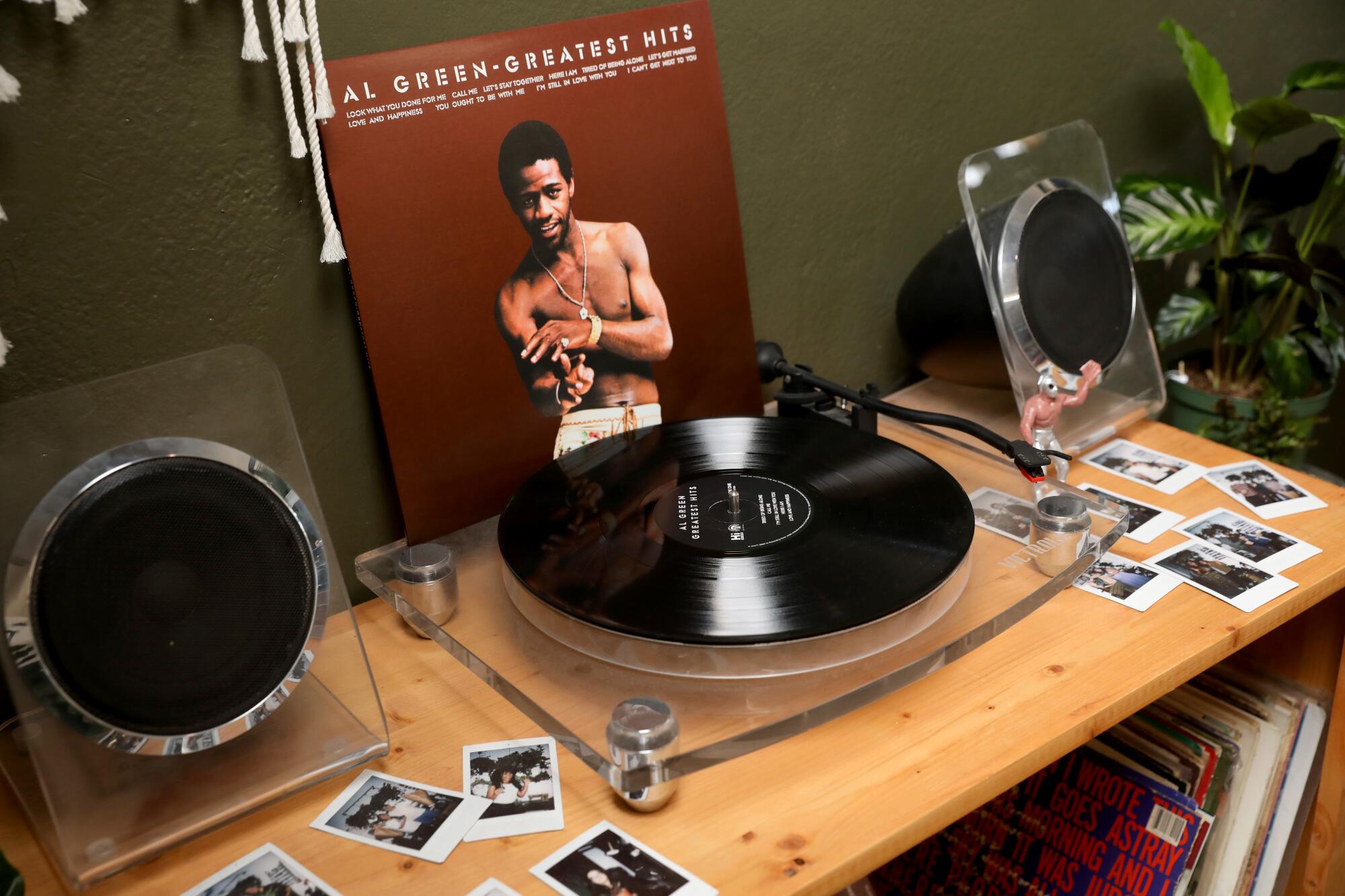
Stronger than their opinions on music are their opinions on plants. Cesar raves about the purple waffle as Juan and Carla burst out laughing.
Cesar smiles and side-eyes them. “The plant that like nobody else likes here, I guess,” he says. “I love it. It’s so cool.”
“The best part is that Cesar bought like 20 of them,” Juan says of the crinkly, purple-tinted perennial. “We never buy a stock of 20 plants ever. We usually buy at most 10 or 15, but Cesar for some reason liked this plant so much that he decided to buy 20 of them, and now there’s 20 purple waffles throughout the whole store.”
Aside from Cesar’s infatuation with purple waffles, Carla loves cactus — a passion grown from family trips to Baja. Juan points to his leg, inked with a mini monstera.
While plants are the stars of Semilla, there’s far more to see in the shop than greenery. Mementos from the Duran family are scattered throughout the space, from the sewing machine given them by their neighbor to their mother’s homemade candles.
As the drought continues, Californians are tearing out their lawns. Here’s a DIY guide to killing grass to prep for a drought-tolerant landscape.
A potted Dieffenbachia rests on a chipped Craftsman toolbox, a nod to the Durans’ love for cars. With a mechanic as a father, they all picked up the habit of restoring old vehicles. A peek behind the store might mean a sighting of Juan’s ’63 Dodge Dart convertible or Cesar’s 1970 Mercedes Benz. Then there’s the spontaneously purchased — and allegedly ugly — old lowrider limo that they mostly use for rides to Home Depot.
In the calathea lounge, potted plants surround an old camera from an Oklahoma antique shop, a la “American Pickers.” Behind it rests a childhood typewriter on which the Durans learned to type — homage to their uncle’s typewriter repair business.
“Sometimes we’ll put paper and write like dumb little messages to each other, just because it looks cool. You know? Like…,” Juan starts to laugh. “Like a fake ransom note.” His siblings lose it.
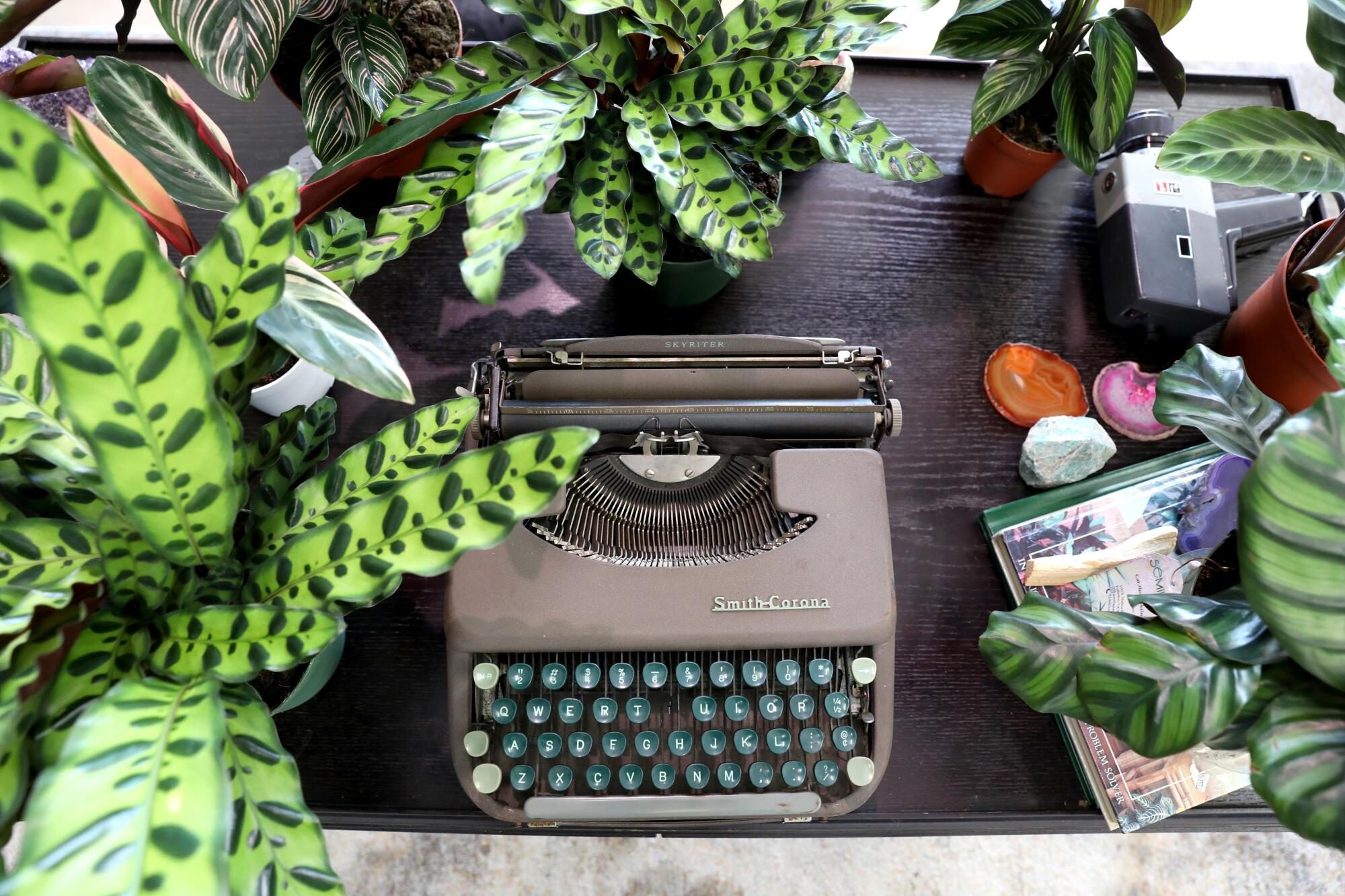
Above the register is a framed, faded map of Sinaloa, Mexico, where much of the massive Duran family still resides. Cesar, Carla and Juan’s parents immigrated to Southern California before they were born but the family travels frequently back to visit. The siblings grew up in their Fullerton home, rooted in the community long before their business.
Their house should have been the first indicator of their botanical future. “Mini TJ” brims with fruit trees and sweet-smelling lavender bushes to craft a backyard rainforest that reminds them of Sinaloa. Socorro Duran warns her children to take care of her plants when she’s away, and Mother’s Day brunch is forgotten in favor of a plant nursery trip. Once, during an eclipse, she convinced them to move a 10-foot avocado tree to the yard’s other side because it looked sad, Cesar says.
Says Louis Easton, aka the Plant Mon: “In the Black community, if you say you work like a Jamaican, it means you wear many hats. And that’s me.”
“I swear I dug so many holes for trees as a kid.” He smiles. “My mom would be like, ‘We’re gonna put an avocado tree in the backyard, do you want to dig a hole?’ And you’re like a 10-year-old like, ‘OK, I’ll help,’ and then you realize it’s hard labor. Like I just got bamboozled.”
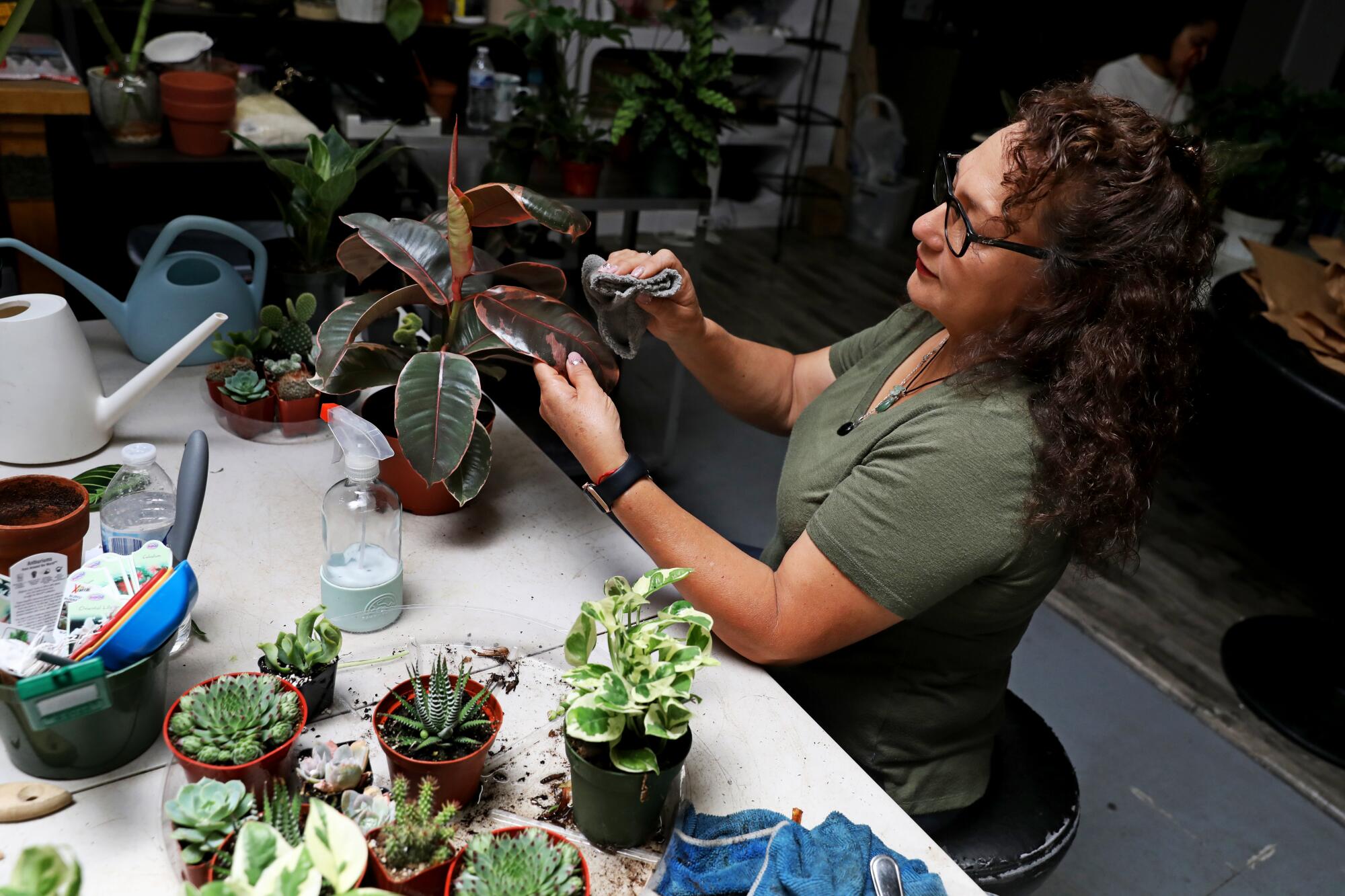
On Mondays, Socorro comes to Semilla to water and sing to the foliage. The shop is small, its heart kept beating by a staff of six: the Duran siblings, Socorro, Cesar’s girlfriend, Ana, and Juan’s girlfriend, Vivian, who pokes her head in to open the shop.
“They’re clowns, and they’re savages,” Carla says of her brothers, and jokes, “Juan’s girlfriend works here — he fires her at least three times a day.”
Juan shrugs. “Before my first cup of coffee, I’ve gotta fire her.”
“He doesn’t have firing authority,” Carla says.
The tight-knit family creates a lively aura in the shop, hosting unique events for the community. During “Pot & Sip,” aspiring plant parents make their own terrariums while drinking wine. Other days, the Durans don white coats and scribble on prescription notepads for the “Plant ER,” where people bring their weakening plants for check-ups.
Perhaps the biggest symbol of community? The pool table in the back of the shop. Customers play often — the Durans recently hosted a pool tournament, where challengers battled it out for a 10-inch monstera.
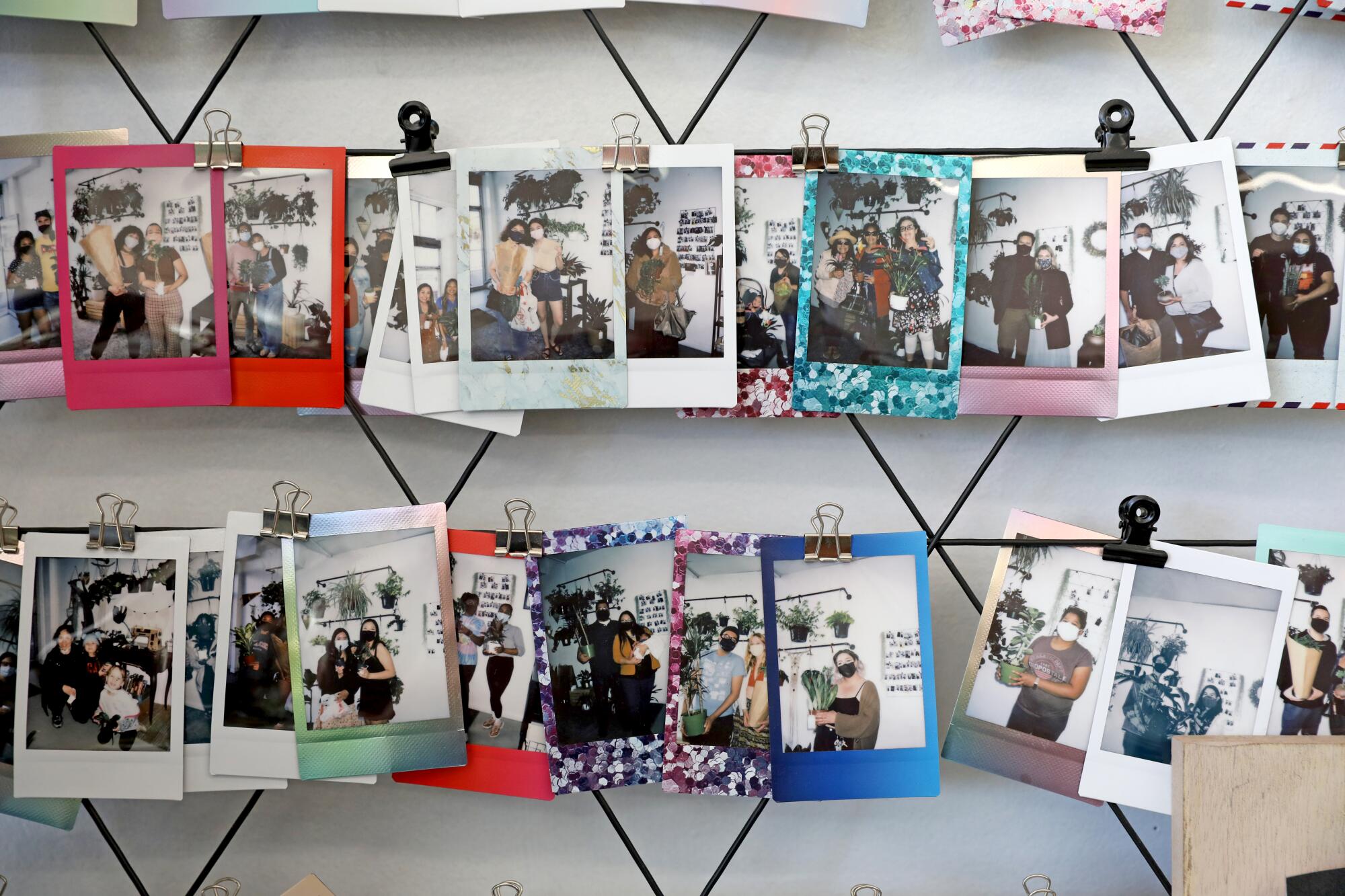
In late summer, a second store will root in Florida’s South Beach, a mere two blocks from the seaside. The siblings will take turns flying there to operate the new venture. Eventually, they’ll hire and train Florida locals to run it full-time. After all, there’s the family rule that the Durans are adamant about: No one is allowed to move more than 50 miles away.
Tattoos of plants, flowers and leaves offer healing to plant-loving Angelenos.
“We’re definitely staying here in Fullerton,” Cesar insists. “We love it here. This is our home; this is always gonna be our flagship store, even if we opened up like 10 locations, right? It’s like our baby.”
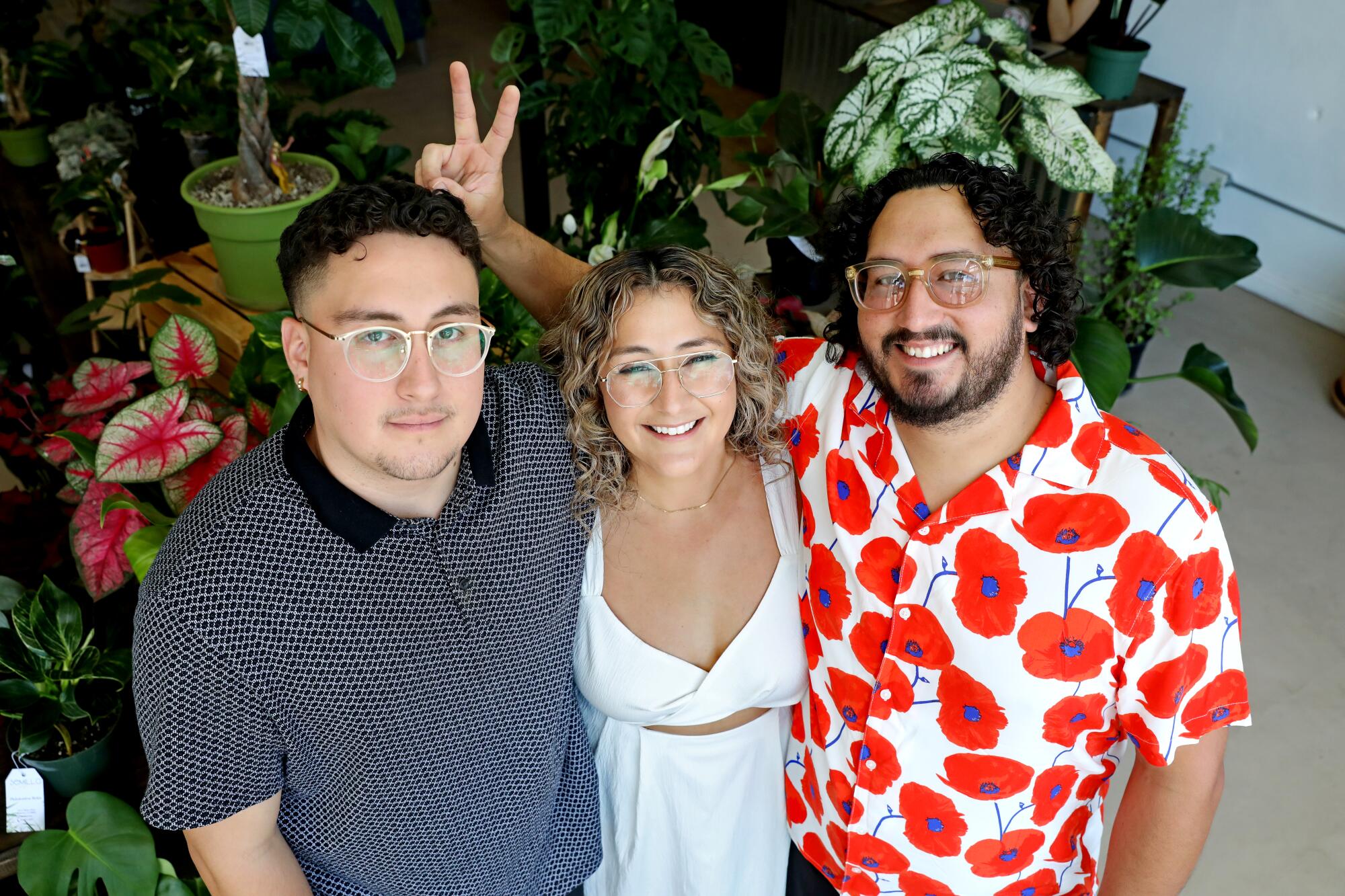
When the Durans selected a shop name, they knew two things. They wanted a Spanish word, and they wanted it to mean something to them. After sifting through ideas, they settled on semilla — the Spanish word for “seed.”
Carla recalls the Spanish saying, “Hoy semillas, mañana flores,” which translates to “Seeds today, flowers tomorrow.” Carla says that’s the goal of Semilla: to create a beautiful future for everyone. Cesar’s vision of a business that his whole family could get involved in stretches beyond DNA.
“We just felt like the concept of Semilla was really cool,” Cesar says. “It’s like us planting our seed in the community that’s gonna grow, and help the community grow as well.”
